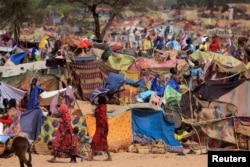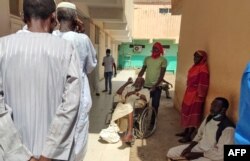UNICEF warns that 300 days of conflict in Sudan has unleashed a wave of atrocities on children, with hundreds of thousands suffering from hunger, violence and horrific abuse.
According to the U.N. children’s agency, 4 million children in Sudan have been displaced, in what is seen as “the world’s largest child displacement crisis.” To break down the magnitude of the conditions, UNICEF said 13,000 children have been displaced and thrust into a situation of chaos and despair every day for the past 300 days.
UNICEF spokesperson James Elder, who had just returned from Sudan, said Friday that the children have lost everything. He said they are not safe from the fighting raging around them, and they have lost all their possessions; many are separated from family and friends. He said they have lost hope that things will get better.
“The consequences of the past 300 days mean that more than 700,000 children are likely to suffer from the most dangerous form of malnutrition this year. UNICEF will not be able to treat more than 300,000 of those without improved access and without additional support. In that case, tens of thousands would likely die,” he said.

During the same period, Elder said, there has been a five-fold increase in verified cases of killings, sexual violence and recruitment from a year ago. That, he observed, equates to a terrifying number of children killed, raped or recruited.
“And these numbers are the tip of the iceberg,” he said.
The war between Sudan’s national army and the paramilitary Rapid Support Forces is ravaging a whole society, he said, with the fighting impeding humanitarian aid from reaching millions of desperate people.
He said two-thirds of the population lack access to health care, warning that Sudan’s shattered health system threatened to kill many more children than the armed conflict itself.
“This is a perfect storm,” he said. “You have a devastated health system, an ongoing conflict, incredible numbers of seriously malnourished children, woefully depleted aid and obstruction to that aid.
“Tens of thousands of children are dying from this,” he said.
The World Food Program said 18 million people in Sudan face acute hunger, including 4.9 million people who already face emergency levels of food insecurity, according to Tarik Jasarevic, a World Health Organization spokesperson.
The latest food security analysis for Sudan shows the highest levels of hunger ever recorded during the October-February harvest season. That follows the RSF’s capture of Wad Madani, the capital of Al Jezira state, known as the country’s breadbasket.
U.N. agencies fear conflict-hit hot spots — Khartoum, Kordofan and Darfur — will face catastrophic hunger conditions by the next lean season, which could begin next month if humanitarian assistance is not significantly increased.
Jasarevic said people are dying from a lack of access to basic and essential health care and medicine. He said disease outbreaks are spreading throughout the country, noting that more than 10,000 cases of cholera and nearly 300 deaths have been reported from 11 of Sudan’s 18 states. He added that reports of measles, malaria, dengue and other potentially deadly diseases also are being received from several states.

Jasarevic said that acute hunger and malnutrition will have a lasting generational impact on the health of the population but that many lives can still be saved.
“Babies can recover very quickly from severe acute malnutrition. If there is a possibility to provide them with therapeutic feeding, they can go from the brink of death to playing in these health centers in a matter of days,” he said.
UNICEF Executive Director Catherine Russell warned, “The lethal combination of malnutrition, mass displacement and disease is growing by the day, and we have an extremely short window to prevent a massive loss of life.
“We need safe, sustained, and unimpeded humanitarian access across conflict lines and across borders. We need international support to help sustain the essential services and systems that children rely on for survival,” she said.
Earlier this week, the United Nations launched a $4.1 billion appeal to provide urgent aid for 14.7 million people inside Sudan and 2.7 million people who have taken refuge in five neighboring countries.
At the event, Martin Griffiths, the U.N. undersecretary general for humanitarian affairs and emergency relief coordinator, said that he had been in touch with Sudan’s two rival generals about restarting negotiations for humanitarian access. He said he was awaiting a response to his request.
In the meantime, UNICEF’s Elder said the war, which began April 15, is ravaging a whole society and “destroying the future of an entire generation.”
“The way to get out of this nightmare is for those in power to negotiate a cease-fire and ensure aid is no longer blocked,” he said. “Those in the region need to show leadership and those in donor countries need to show compassion and humanity” by helping the many at-risk children to survive.




